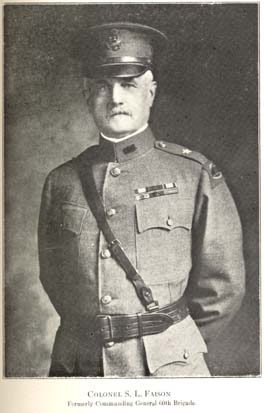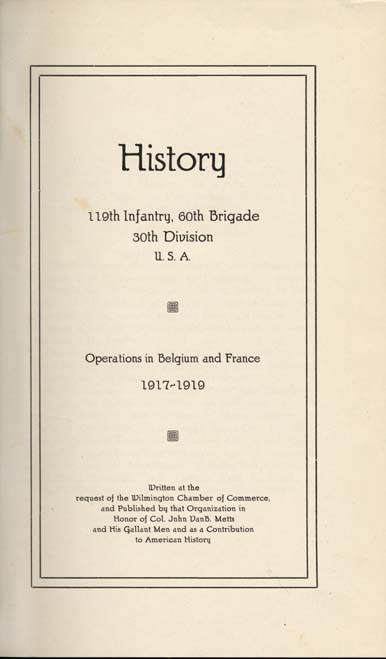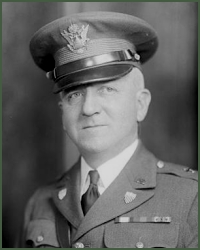
Mission Statement:
"To advance through research, education and symposia, an increased public awareness of the Cape Fear region's unique history."

Major-General John Van Bokkelen Metts
Wilmington Native, Businessman and Soldier
Cape Fear Historical Institute Papers
Major-General John Van Bokkelen Metts
An early member of the famed Wilmington Light Infantry, John Van Bokkelen Metts was serving as a lieutenant-colonel with the North Carolina National Guard when called into active US military service in June, 1916 to deploy with the
Second Infantry, NC National Guard in Mexico. Between
1916 and March 1917 his unit was part of the Mexican
Border Crisis force suppressing Pancho Villa’s army
and was here commissioned full colonel.
The Second North Carolina returned home in March 1917
with many called into service when the United States
declared war against Germany. Colonel Metts led his
men into Europe, now-designated as the One-Hundred Nineteenth Infantry Regiment, Thirtieth
Division of the United States Army, his brigade
commanded by Brigadier-General Samson L. Faison,
a native of Faison, NC and combat veteran of
the Indian Wars and Philippine Islands Campaign.

After arriving in Europe in early May, 1918,
Col. Metts brigade began intense organization and
training for trench warfare with British and Australian
troops. The ensuing operations of the One Hundred Nineteenth Regiment during September and October
focused on the St. Quentin and Cambrai area,
including an important assault upon the Hindenburg
Line at the former. Considered impregnable at
St. Quentin, this line was defended by vast fields
of heavy barbed wire, trenches and connecting
tunnels, all guarded by machine guns in
concrete fortified emplacements.
Col. Mett’s regiment attacked early Sunday
morning, Sept. 29th, 1918, after the most terrific
artillery barrage the Western Front had seen to date.
He and his men fought through broken German
fortifications and soon occupied the town of
Bellicourt and the St. Quentin canal.
The fog and barrage smoke was said to be so intense
during the attack that a compass was necessary to
keep proper direction and the dead scattered all over
the battlefield. Shell holes were so numerous
“that one could not walk three steps without
falling into one.”
As the regiment advanced further it encountered
heavier German artillery fire which included
mustard gas shells.
Colonel Metts was in command of his regiment at
both Ypres operations, as well as the Somme offensive.
For meritorious conduct and exemplary combat
leadership he was awarded the Distinguished
Service Medal and received high recognition
for his regiment’s success in helping break the
Hindenburg Line at St. Quentin.

Returning to the US in April 1919, Colonel Metts was
ordered to Washington for duty with the General Staff;
in May 1920 he returned to his home State and
commissioned adjutant-general by Gov. Thomas Bickett.
While holding this office General Metts commenced
a re-organization of the State’s National Guard, then in
1926 assumed command of the Sixtieth Brigade, Thirtieth
Division, United States Army, as brigadier-general.
In 1940 he was appointed State director of Selective
Service under Gov. Clyde R. Hoey and served in
this capacity throughout World War II. In 1949,
he was promoted to the rank of major-general.
After a long military career and serving as
North Carolina’s adjutant-general for thirty-one years
under nine governors, General Metts retired to
private life. His lifetime achievements were
many and included being president of the
Adjutant Generals’ Association of the United States
and serving on the National Guard’s executive
committee plus several standing committees.
President Harry S. Truman awarded the Medal of Merit
for Selective Service to General Metts, with further awards being the Distinguished Service Medal of the National
Guard Association of the United States in 1955, and the
North Carolina Distinguished Service Medal in 1956.
Early Life
General Metts was born in Wilmington on
December 17, 1876, fourth in a family of
six children, to parents James Isaac Metts and
Cornelia Cowan Metts.
An early ancestor was Frederick Metts, who fought in the Revolution under the Swamp Fox, Francis Marion.
His father, James Isaac Metts, served with both the
Eighteenth and Third North Carolina Regiments,
and fought with Lee’s Army of Northern Virginia.
Shot through a lung and captured at Gettysburg,
he was imprisoned at Johnson’s Island prison in
Ohio until exchanged in April 1864 in such poor
health that his obituary had been prepared in advance.
Metts fourth son was named in memory of boyhood
friend and Company D, Third North Carolina Regiment
commander, Capt. John Van Bokkelen, who died
of intestinal fever in late June 1863 near Richmond.
Postwar, General Mett’s father went into business
partnership with his wartime Colonel and prewar
president of the Wilmington & Weldon Railroad,
Robert H. Cowan. James Isaac Metts married
Cowan’s daughter Cornelia, John Van Bokkelen
Mett’s mother.
As a youth General Metts attended Wilmington’s
Tileston Normal School, and was enrolled in the
Cape Fear Academy classical curriculum until age
sixteen. He then spent two years with his
father’s wholesale grain business before joining
the Walker Taylor Insurance Company. There he
worked for five years, sold the acquired interest
in the firm and opened his own general insurance
agency in Wilmington.
To guide his sons in their business careers, father
James Isaac Metts wrote a note for them to follow,
entitled “Don’t.”
“Don’t forget that perseverance, politeness and patience unlock the door of success; Don’t forget to carry out your instructions to the letter; Don’t forget to keep your
business to yourself. Discuss it only with those
interested; Don’t forget that the act of giving up
a set purpose in view of a possible contingency,
is dangerous to character; Don’t forget to
associate with businessmen on the road. Father.”
His military interest began in 1894 when Metts joined
the Wilmington Light Infantry military organization as
a private -- rising through the ranks to captain in 1903
and lieutenant-colonel in 1907. He was also at that
time active in Wilmington civic affairs and served as
a New Hanover County Commissioner. In 1906,
he married Josephine Budd of Petersburg, Virginia,
their union produced two children, Josephine
Budd Metts Huntt, and John Van B. Metts, Jr.
General Metts lived in Raleigh while North Carolina’s Adjutant-General from 1920 onward, residing there until his death on October 14, 1959. He is buried in Wilmington’s Historic Oakdale Cemetery.
Notes and References:
North Carolina Troops, 1861-1865, A Roster. Vol. III, Infantry. NC A&H 1971
Doctor to the Front, Donald Koonce, UT Press, 2000
Metts, John Van B., Josephine Metts Huntt, 1991; NCpedia
History of the 119th Infantry, 30th Division, US Army Operations in Belgium and France, 1917-1918, Coleman B. Conway, DocSouth, 1920.
North Carolina Biography, Vol. III, 1929, 1941.
©2006 Cape Fear Historical Institute
